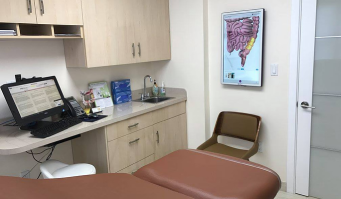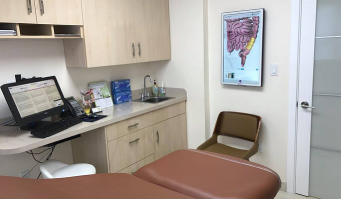Ulcerative Colitis
- Over 1000 5 Star Reviews
- Personalized Care
- Award Winning GI Specialist
What is Ulcerative colitis?
Ulcerative colitis (UC) is a chronic inflammatory bowel disease (IBD) characterized by inflammation and ulceration (open sores) within the digestive tract. Specifically, UC affects the innermost lining of the large intestine (colon) and rectum. The onset of symptoms typically occurs gradually rather than abruptly. While there’s no definitive cure for UC, several innovative treatment options are now available to significantly alleviate symptoms and induce long-term remission.
CAUSES OF Ulcerative colitis?
While the precise cause of ulcerative colitis remains elusive, past assumptions attributing it to diet and stress have been debunked. Recent research suggests these factors may exacerbate symptoms but are not the root cause.
One potential explanation lies in immune system malfunction. When fighting off invading viruses or bacteria, an atypical response triggers the immune system to attack healthy cells in the digestive tract, leading to inflammation and ulcer formation.
Genetics also appears to play a role, as the disease is more prevalent in individuals with family members who have it. However, the majority of individuals with ulcerative colitis lack this family history, indicating a complex interplay between genetic predisposition and other unknown factors.
Symptoms of Ulcerative colitis?
- Diarrhea, often with blood or pus
- Rectal bleeding — passing small amount of blood with stool
- Abdominal pain and cramping
- Rectal pain
- Urgency to defecate
- Inability to defecate despite urgency
- Weight loss
- Fatigue
- Fever
- In children, failure to grow
DIAGNOSIS of Ulcerative colitis?
- Blood tests.
- Stool studies
- Flexible sigmoidoscopy.
- X-ray
- CT scan
Treatment of Ulcerative colitis?
Anti-inflammatory medications
Anti-inflammatory medications are often the first step in the treatment of ulcerative colitis and are appropriate for most people with this condition. These include:
- 5-aminosalicylates
- Corticosteroids
Low-grade dysplasia:
- Verification:
- Close monitoring:
- Treatment: Due to the cancer risk, treatment may be initiated if the diagnosis is confirmed. Preferred options include:
- Endoscopic resection:
- Radiofrequency ablation:
- Cryotherapy:
- Additional treatment:
Immune system suppressors
These medications also reduce inflammation, but they do so by suppressing the immune system response that starts the process of inflammation. For some people, a combination of these medications works better than one medication alone.
Immunosuppressant medications include:
- Azathioprine (Azasan, Imuran)and mercaptopurine (Purinethol, Purixan).
- Cyclosporine (Gengraf, Neoral, Sandimmune).
Biologics
This class of therapies targets proteins made by the immune system. Types of biologics used to treat ulcerative colitis include:
- Infliximab (Remicade), adalimumab (Humira) and golimumab (Simponi).
- Vedolizumab (Entyvio).
- Ustekinumab (Stelara).

“Thank you for visiting Forest Hills Gastroenterology & Liver Disease, my goal is to treat my patients in a highly personalized manner and I am dedicated to give you the utmost attention and respect that you deserve. For more infromation on this disease or to schedule a consultation with me, please give us a call or book a tele-health appointment online.”
Albert Shalomov
Dr. Albert Shalomov, MD
Disclaimer: Educational Infromation, Not Medical Advice
It’s important to remember that the information provided here is intended for educational purposes only and should not be misconstrued as definitive medical advice. Always seek the guidance of a qualified gastroenterologist for accurate diagnosis and treatment of any specific gastrointestinal condition. Only trained healthcare professionals can provide personalized recommendations and ensure your well-being.




